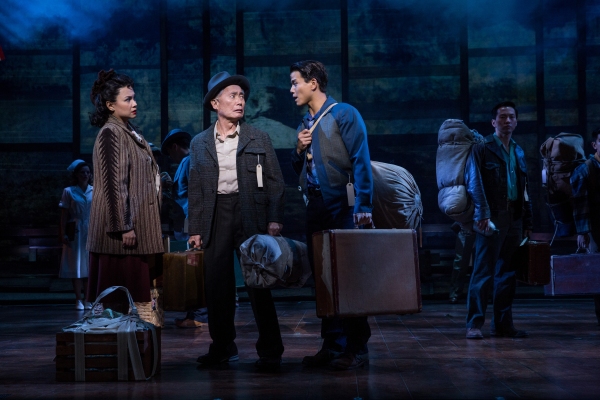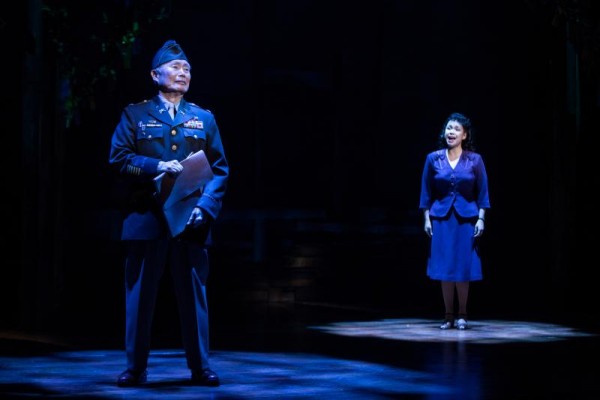
Kei Kimura (Lea Salonga), her grandfather, Ojii-chan (George Takei), and brother, Sammy Kimura (Telly Leung), are relocated to an interment camp in ALLEGIANCE (photo by Matthew Murphy)
Longacre Theatre
220 West 48th St. between Broadway & Eighth Ave.
Tuesday – Sunday through February 14, $45-$149
allegiancemusical.com
www.shubert.nyc
Seventy-four years ago today, Japan staged a surprise attack on the U.S. naval base at Pearl Harbor, leading to America’s entry into WWII. It also led to one of the most shameful acts in U.S. history, as more than 120,000 Japanese Americans were forcefully removed from their homes and imprisoned in internment camps. The fictionalized story of one such family is told in the Broadway musical Allegiance, a timely, overly earnest, yet involving tale running at the Longacre Theatre. Allegiance tells the story of the Kimura clan, whose farm is seized by the U.S. government while they are marched to the Heart Mountain Relocation Center in Wyoming, where they live behind barbed wire, under strict rules — all because of their Japanese last name and ancestry. The family consists of elderly patriarch Ojii-chan (George Takei), single father Tatsuo Kimura (Christòpheren Nomura), daughter Kei Kimura (Lea Salonga), and son Sammy Kimura (Telly Leung). Sammy wants to join the U.S. Army, fighting for the right to defend the country in which he was born; meanwhile, his father, a Japanese native, refuses to sign a loyalty oath to America after the family’s internment, and Frankie Suzuki (Michael K. Lee), who also lives in the camp and has struck up a friendship with Kei, leads a protest when Japanese Americans suddenly become eligible for the draft. Caught in the middle is Mike Masaoka (Greg Watanabe), the real-life California-born national secretary of the Japanese American Citizens League, who is collaborating, in good faith, with the U.S. government over the treatment of the people in the camps.

Sam Kimura (George Takei) remembers where it all went wrong with his sister (Lea Salonga) (photo by Matthew Murphy)
As has been well documented, Allegiance was inspired by the true story of Star Trek veteran and social media sensation Takei, who was five years old when his family was forced at gunpoint to leave their Los Angeles home in 1942 and move first to a horse stable, then to the Rohwer War Relocation Center in Arkansas. The character of Sam Kimura, whom Takei plays as an old man at the beginning and the end — the main events are told in flashback — is based on not only Takei but also his father, Norman Takei, and war hero Ben Kuroki. The book, by composer and lyricist Jay Kuo (Insignificant Others), co-lead producer Lorenzo Thione, and Marc Acito (Birds of a Feather), is both passionate and predictable, trite and treacly, with underdeveloped subplots (primarily Sammy’s relationship with nurse Hannah Campbell, played by Katie Rose Clarke), and the songs are cliché-ridden and overzealous, featuring such giveaway titles as “Do Not Fight the Storm,” “What Makes a Man,” “Our Time Now,” and “Stronger than Before.” The cast is accomplished, led by Tony winner Salonga (Miss Saigon, Les Misérables), but Stafford Arima’s (Altar Boyz, Carrie) direction is fairly static and Andrew Palermo’s (The Other Josh Cohen) choreography lacks imagination. One wonders if the very urgent story would have been served better as a straight play instead of an overwrought, melodramatic musical. But the main reason the show exists is because of the tireless dedication of Takei, in his Broadway debut. Over the last several years, Takei, who played Lt. Hikaru Sulu on Star Trek for three years on television and then in six big-screen adventures, has become a leading figure in the battle over same-sex marriage (he married his longtime partner, Brad Altman, in September 2008) as well as other social causes (he has more than 9 million likes on Facebook and nearly 1.8 million followers on Twitter), and he was the subject of the 2014 documentary To Be Takei. Takei almost single-handedly has kept alive the truths behind the Japanese American internment camps, an issue that relates directly to the current controversy over Syrian refugees and possible databases of Muslim Americans. “These worrisome developments only strengthen my resolve to keep telling our story and remembering the past so we do not repeat it,” he notes on a handout that comes with the Playbill. Takei, with his big, welcoming smile, riotous sense of humor, and fearlessness in standing up for what he believes in, is an inspiring American, and it is heartwarming watching him in such an important, if not completely successful, Broadway production, one that will very likely have you teary as you leave the theater. For more on the show and Takei, you can follow his online “Trek to Broadway” here.